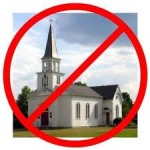 10 Ways The Church Might Change: Point 6
10 Ways The Church Might Change: Point 6
[In a previous blog I have outlined 10 possible changes the Church may face in the future. This is point 6 in the series: Plurality will replace individualism. The New Testament emphasizes “the priesthood of believers”. No where does it edify the individual priest (except Jesus as our High Priest). In America, we emphasis the Bill of Rights, the rights of each individual, but that is not the case in the Bible. In the kingdom of God we have no “rights”. We under the loyal service, the Lordship, of our King and High Priest, Jesus Christ, thus a member of a “royal priesthood”. Instead we live under the “grace” and “mercy” of our Lord Jesus Christ, always “serving” others. The Great Commission is always outward, not inward. Change is coming in the way the Church understands the doctrine of “the priesthood of believers”.]
 The gospel is full of what seems to be paradoxes that turn out to be truths. For example the Bible speaks of plurality often as a singular form. The Godhead is plural (Father, Son, Holy Spirit), yet it is singular (“There is only one God.”). We talk of the Trinity as the three in one, the singularity of one with a tri-faceted nature. The Church, the Priesthood of Believers, is another example, for the New Testament speaks of it as a single entity, yet it is made up of plurality: peoples of many cultures, races, nationalities, and labels who are extremely different but all believe in Jesus Christ as their Savior, Lord, and High Priest. The Church, referred to singularly, is composed of plurality, a multi-faceted nature.
The gospel is full of what seems to be paradoxes that turn out to be truths. For example the Bible speaks of plurality often as a singular form. The Godhead is plural (Father, Son, Holy Spirit), yet it is singular (“There is only one God.”). We talk of the Trinity as the three in one, the singularity of one with a tri-faceted nature. The Church, the Priesthood of Believers, is another example, for the New Testament speaks of it as a single entity, yet it is made up of plurality: peoples of many cultures, races, nationalities, and labels who are extremely different but all believe in Jesus Christ as their Savior, Lord, and High Priest. The Church, referred to singularly, is composed of plurality, a multi-faceted nature.
In the Old Testament, the priesthood was established so man could “draw near” to the God that he had alienated due to sin and present sacrifices to atone for his sins. In the New Testament, because of what Jesus did on the Cross as an atonement for all sin, any man can now “draw near” to God just by asking Jesus into his heart. Scripture says, “Do you not know that your body is the temple of the Holy Spirit.” Since God’s Spirit, His Holy Spirit, can dwell in our bodies, our temples, that qualifies us to be Priests unto the Holy Spirit of Jesus Christ once we have made this step of faith. All these priests combined, in plurality, make up the Priesthood of Believers, or the Church, singular. Nowhere in the New Testament does it refer to priest in the singular sense, other than Jesus being our High Priest, but it refers to priests, the Church, as the Priesthood of Believers, in the singular. Many are One = the Church. That is why the “priestly prayer” of John 16 is so important, because Jesus recognizes the power of many only if they are ONE! That is why he prays for their unity. The singular Godhead functions in plurality, so the singular Church can also function in plurality.
 So how can something as diverse as the Body of Christ, the Church, the Priesthood of Believers, function as ONE? Simple:
So how can something as diverse as the Body of Christ, the Church, the Priesthood of Believers, function as ONE? Simple:
1) The Church has to recognize the plurality of the Trinity: the Godhead of the Father, the atoning sacrificial Lamb of obedience and service of the Son, Jesus, and the releasing of the Holy Spirit upon all believers after Jesus’ ascension back to his Father. The Church has to recognize the role of the Holy Spirit of Jesus Christ in their midst today, why he is here, and what he is doing. They have to learn to listen to his voice, and most importantly, be obedient to what the Holy Spirit directs them to do. The voice of the Holy Spirit is the voice of Jesus Christ, the High Priest, to his people, the Priesthood of Believers, the Church.
2) The Church has to recognize the plurality of its own make up, the diversity within the Body of Christ as equals, one, functioning as one. Ephesians 4:7 says, “When He ascended on high, He led captive a host of captives, and He gave gifts to men.” The people of God, the Believers of Jesus Christ, the Church, is very diverse because its people have many giftings, many talents, many passions, many visions, many voices, and many points of view, yet they are to speak with one voice: JESUS. Everything they say and do should point to JESUS even though it may be in different ways, different dialects. The Church has a plurality of messengers and styles of presentations, but only one singular message: JESUS.
3) The Church has to not only recognize its diversity but accept it as its strength. It needs to clean up its message, thus the need for apostles, even today, and establish apostolic teaching that will unite the church not divide it by doctrine and theology, so the Church can speak with one voice: JESUS. The voice may sound slightly different due to the accents of diversity, but the united message will always be the same: JESUS.
4) After accepting all this diversity, this plurality, the Church has to learn to “equip the saints”, these diverse creatures, for “the work of service” to proclaim one singular message: JESUS. The Church has to be willing to “release” these saints to do the work. But logistically, from an institutional standpoint, how do you do that? SIMPLE: by allowing Jesus to be the High Priest of His Priesthood of Believers and speak through His Holy Spirit, the Spirit of Jesus Christ, to his priests who must be obedient to what they have been told by Him. Only then will the plurality of the Priesthood of Jesus Christ, the Body of Christ, the Church speak as a single voice with one message: JESUS!


































































































